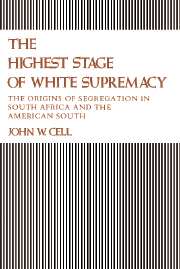Book contents
- Front Matter
- Contents
- Preface
- 1 The Problem of Segregation
- 2 Contemporary Perspectives
- 3 Recent Interpretations of the Origins of Segregation in South Africa
- 4 The Origins of Segregation in the American South: The Woodward Thesis and Its Critics
- 5 The South Makes Segregation: The Economic Interpretation
- 6 The South Makes Segregation: The Social Interpretation
- 7 A Note on Southern Moderates and Segregation
- 8 South Africa Makes Segregation
- 9 Conclusion: Reactions to Segregation
- Notes
- Index
4 - The Origins of Segregation in the American South: The Woodward Thesis and Its Critics
Published online by Cambridge University Press: 22 September 2009
- Front Matter
- Contents
- Preface
- 1 The Problem of Segregation
- 2 Contemporary Perspectives
- 3 Recent Interpretations of the Origins of Segregation in South Africa
- 4 The Origins of Segregation in the American South: The Woodward Thesis and Its Critics
- 5 The South Makes Segregation: The Economic Interpretation
- 6 The South Makes Segregation: The Social Interpretation
- 7 A Note on Southern Moderates and Segregation
- 8 South Africa Makes Segregation
- 9 Conclusion: Reactions to Segregation
- Notes
- Index
Summary
The recently formulated interpretation that I discussed in the previous chapter – that segregation crystallized in South Africa as a system and ideology only after 1900, that it was a distinctively modern response to the development of new and modern conditions, and that only afterward was it made to appear to be the logical, natural, and even inevitable conclusion of that country's traditional pattern of race relations – is one that may strike students of the American South as familiar. In the American case, however, the positions are reversed. The argument that segregation emerged dramatically in the 1890s and that it was closely related to the bourgeois New South movement is no iconoclasm of young radicals, Marxist or otherwise. It belongs instead to the widely acknowledged dean of Southern historians, C. Vann Woodward. First developed implicitly in his great work of synthesis, Origins of the New South (1951), and then explicitly (but with what, I shall argue, are important differences) in the immediate aftermath of the U.S. Supreme Court's historic Brown decision of 1954, the argument of The Strange Career of Jim Crow (1955) corresponds to what in South African historiography would be called the liberal orthodoxy.
The American revisionists, on the other hand, have been trying to establish the very proposition that has been under attack in South Africa. They have emphasized the bitter legacy of slavery, the strong and very old tradition of racism, the continuing institutions and attitudes of white supremacy.
- Type
- Chapter
- Information
- The Highest Stage of White Supremacy , pp. 82 - 102Publisher: Cambridge University PressPrint publication year: 1982
- 3
- Cited by



